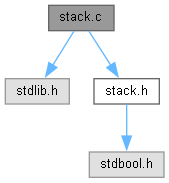Implementation of the supporting functions for the StackEntry structure that represents a simple stack. More...

Go to the source code of this file.
Functions | |
| static StackEntry * | StackEntry_Create (void *item) |
| Create a new StackEntry object with the given item. | |
| static void | StackEntry_Destroy (StackEntry *entry) |
| Destroys the specified StackEntry object. After this function returns, the object is no longer valid. | |
| void | Stack_Push (StackEntry **stack, void *item) |
| Push the given entry onto the given stack. | |
| void * | Stack_Pop (StackEntry **stack) |
| Pop the last entry from the given stack, returning the item. | |
| bool | Stack_IsEmpty (StackEntry **stack) |
| Determines if the given stack is empty. | |
Detailed Description
Implementation of the supporting functions for the StackEntry structure that represents a simple stack.
Definition in file stack.c.
Function Documentation
◆ Stack_IsEmpty()
| bool Stack_IsEmpty | ( | StackEntry ** | stack | ) |
Determines if the given stack is empty.
- Parameters
-
stack A pointer to a pointer to a StackEntry object representing the top of the stack. Points to a NULL if the stack is empty. This pointer to a pointer cannot be NULL.
- Returns
- Returns true if the stack is empty; otherwise, returns false, there is at least one item on the stack.
Definition at line 82 of file stack.c.
Referenced by Command_Undo().
◆ Stack_Pop()
| void * Stack_Pop | ( | StackEntry ** | stack | ) |
Pop the last entry from the given stack, returning the item.
- Parameters
-
stack A pointer to a pointer to a StackEntry object representing the top of the stack. Points to a NULL if the stack is empty. This pointer to a pointer cannot be NULL.
- Returns
- Returns the item from the top of the stack. Returns NULL if the stack was empty at the time of the call.
Definition at line 63 of file stack.c.
References StackEntry::item, StackEntry::next, and StackEntry_Destroy().
Referenced by Command_Undo(), and Memento_Undo().
◆ Stack_Push()
| void Stack_Push | ( | StackEntry ** | stack, |
| void * | item | ||
| ) |
Push the given entry onto the given stack.
- Parameters
-
stack A pointer to a pointer to a StackEntry object representing the top of the stack. Points to a NULL if the stack is empty. This pointer to a pointer cannot be NULL. item The item to store on the stack.
Definition at line 40 of file stack.c.
References StackEntry::next, and StackEntry_Create().
Referenced by Command_Save_And_Execute(), Command_Undo(), and Memento_SaveForUndo().
◆ StackEntry_Create()
|
static |
Create a new StackEntry object with the given item.
- Parameters
-
item The item to add to the stack.
- Returns
- Returns a new StackEntry object if successful; otherwise, returns NULL, indicating an out of memory error.
Definition at line 16 of file stack.c.
References StackEntry::item.
Referenced by Stack_Push().
◆ StackEntry_Destroy()
|
static |
Destroys the specified StackEntry object. After this function returns, the object is no longer valid.
- Parameters
-
entry The StackEntry object to destroy.
Definition at line 32 of file stack.c.
Referenced by Stack_Pop().